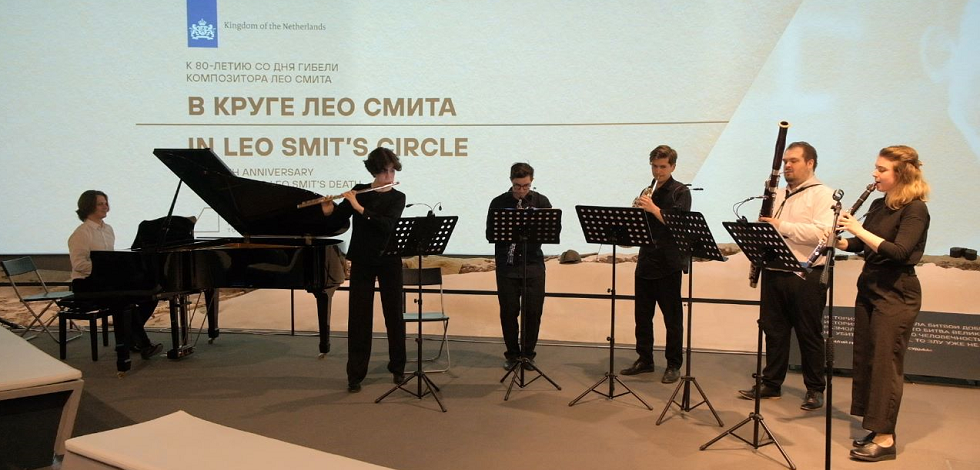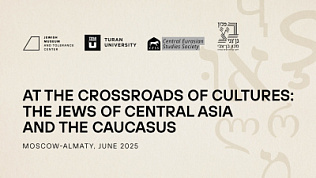Jewish Museum and Tolerance Center hosts a concert celebrating the memory of composer Leo Smit
On May 11, the Jewish Museum and Tolerance Center, with the support of the Embassy of the Kingdom of the Netherlands in the Russian Federation, hosted the first concert held as part of the Forbidden Music Regained project marking the 80th anniversary of composer Leo Smit’s death.
The event was attended by staff members of diplomatic missions from more than 15 countries, including France, Belgium, the USA, Germany, Austria, the United Kingdom, Portugal, Hungary, the Czech Republic, Romania, Moldova, the Netherlands, Ireland, South Africa, Finland, and Greece.
Gilles Beschoor Plug, Ambassador of the Kingdom of the Netherlands:
“On 30 April 2023 it was 80 years ago that Leo Smit was killed in the Sobibor concentration camp. Even being in ghetto he continued to compose. He is an example for all of us as he showed resilience and commitment in tragic political and human circumstances. The concert held at the Jewish Museum & Tolerance Centre yesterday was dedicated to the memory of Leo Smit and other composers of Jewish origin, who died in Nazi concentration camps. This concert was the first event in the project Forbidden Music Regained. In the coming season, we will see an exhibition about composers died in the camps, whose music is heard again thanks to this project. There will be two more concerts, lectures, screenings of documentary films and discussions with the audience”.
Boruch Gorin, Chairman of the Board of the Jewish Museum and Tolerance Center:
“The mission of the Jewish Museum as a cultural institution is to highlight not only widely recognized artistic achievements but also those that have been hidden from view. Because of the Holocaust, we have forgotten or even never known about a lot of talented artists, writers, and thinkers. But we can and we must rediscover the names of people who were first prohibited from creating and later killed; while the context they lived in makes their brilliant works invaluable and profoundly, universally important”.
The concert featured compositions written by Leo Smit in Paris (Sextet for Woodwind Instruments, 1933) and German-occupied Amsterdam (Sonata for Flute and Piano, 1943, which became his swan song) and those written by his friends and colleagues such as Erwin Schulhoff (Divertissement for Oboe, Clarinet, and Bassoon), Darius Milhaud (Suite for Wind Quintet), and Maurice Ravel (Kaddish for Clarinet and Piano). These pieces of music were performed by winners of international competitions: Anton Prishchepa (clarinet, piano), PetRo Duo – Anastasia Rogaleva and Dmitrii Petrov (piano), Maria Koryakina (flute), Fedor Osver (oboe), Olesya Kolotygina (clarinet), Alexey Levin (bassoon), and Alexey Krokhin (French horn). The project is curated by Julia Broido and Valeria Gorokhovksaya while Anton Prishchepa supplies musical direction.
Julia Broido, curator:
“There were a lot of tragic chapters in the history of music in the 20th century. There was an entire generation of European composers who were denied the chance to fully realize their potential. A lot of lives were cut short at the peak of their artistic careers.
And how many would-be musicians, actors, artists, and writers perished before the world got to see them bloom? Unfortunately, there is nothing we can do about it. But what we can do is remember those who had the chance to make a mark before being taken from us by the fire of the Catastrophe.
Leo Smit returned to Amsterdam from Paris right before the war broke out. There is no knowing if he would have lived if he had stayed in France but most of the Jews there actually survived, while only one-fifth of the Jews in the Netherlands were spared. Eighty percent of Dutch Jews were killed back then.
The Holocaust claimed the lives of more than 6,000,000 people in Europe. This May, we remember the victims of that war”.
Leo Smit (14 May 1900, Amsterdam – 30 April 1943, Sobibor) was a prominent Dutch composer of Jewish descent. In 1924, he graduated with honors from the Conservatorium van Amsterdam, where he studied composition with Bernard Zweers and Sem Dresden, and piano. Between 1927 and 1936, he lived and worked in Paris and was greatly influenced by French composers. He then spent a year in Brussels before returning to his native Netherlands in 1937 where his compositions, while he was away, had been sometimes performed by the Concertgebouw Orchestra led by conductors such as Pierre Monteux and Eduard van Beinum. After World War II broke out, Smit gave music lessons in Amsterdam, a city he had been living in with his wife since 1937. In February 1943, he completed his last work, Sonata for Flute and Piano. On April 27, 1943, he was deported from the Netherlands as a Jew and was murdered at the Sobibor extermination camp.
Organized by the Leo Smit Foundation, Forbidden Music Regained (Amsterdam, the Netherlands) is a project dedicated to composers who were persecuted during World War II. The Leo Smit Foundation carries out research, tells composers' stories, and makes their sheet music available.

